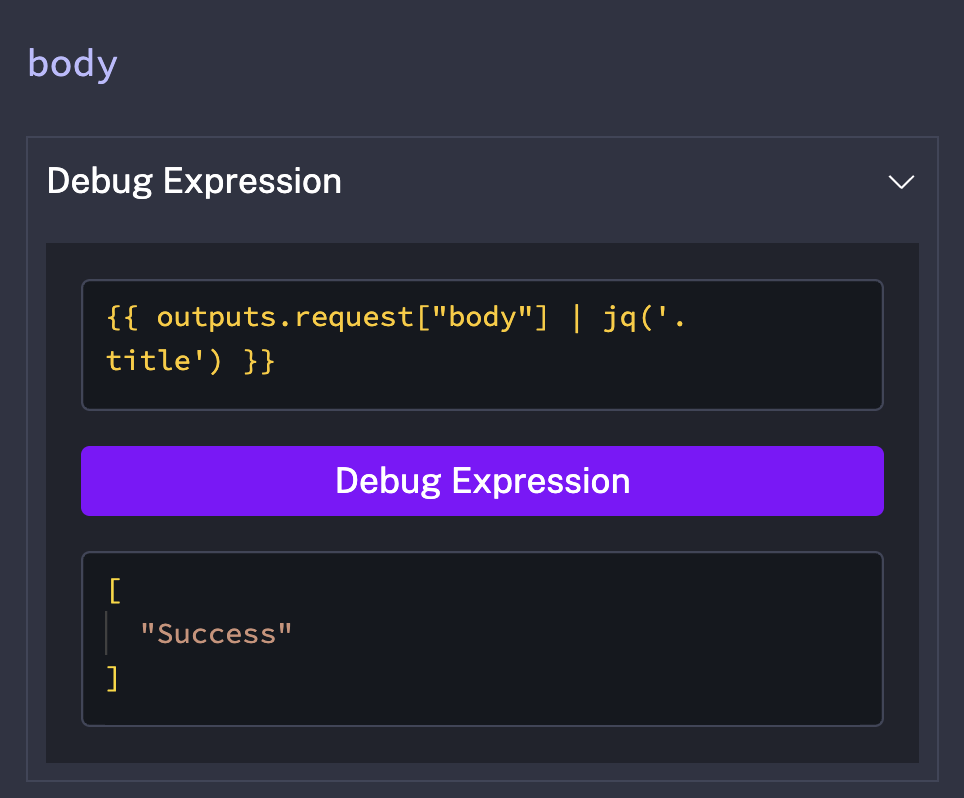Interacting with JSONs in Kestra
Interact with JSONs using expressions.
APIs often use JSON bodies to send data. Being able to interact with them inside of your workflows is crucial to any API related orchestration.
Making a Request Inside of Your Workflow
The API https://kestra.io/api/mock will return a JSON body that looks like the following:
{ "title":"Success", "method":"GET", "params":{}, "code":200, "createdAt":"2025-07-04T15:42:29.545Z", "body":"Request processed successfully"}Kestra can make a request to this API using the Request task. This will give us an output called body containing our JSON body. To access this in later tasks, we can use an expression like {{ outputs.request.body }}. This will return the full body:
id: json_demonamespace: company.team
tasks: - id: request type: io.kestra.plugin.core.http.Request uri: https://kestra.io/api/mock
- id: log type: io.kestra.plugin.core.log.Log message: "My response: {{ outputs.request.body }}"The log message returns:
My response: {"title":"Success","method":"GET","params":{},"code":200,"createdAt":"2025-07-04T16:36:44.193Z","body":"Request processed successfully"}Accessing Part of the Body
However, if the body is large, we may only want to access a certain part of it. To do this, jq is required as the expression returns a string, not a JSON. Using jq, the JSON can be parsed and accessed:
{{ outputs.request.body | jq('.title') | first }}This will access the key title from the JSON. jq will return the result inside of an array when used within an expression. In order to access the value, the function first is added to the end of the expression, removing it from the array.
We can put that into the example:
id: json_demonamespace: company.team
tasks: - id: request type: io.kestra.plugin.core.http.Request uri: https://kestra.io/api/mock
- id: log type: io.kestra.plugin.core.log.Log message: "My response: {{ outputs.request.body | jq('.title') | first }}"The log message says My response: Success.
Nested JSON
If the JSON you’re working with has multiple levels, you can extend the jq expression.
In this example, the API https://kestra.io/api/mock?example=test has additional parameters which return the following body with nesting:
{ "title": "Success", "method": "GET", "params": { "example": "test" }, "code": 200, "createdAt": "2025-07-04T16:39:02.871Z", "body": "Request processed successfully"}The jq expression can be extended as follows to access example:
{{ outputs.request.body | jq('.params.example') | first }}It looks like this when added to the workflow:
id: json_demonamespace: company.team
tasks: - id: request type: io.kestra.plugin.core.http.Request uri: https://kestra.io/api/mock?example=test
- id: log type: io.kestra.plugin.core.log.Log message: "My response: {{ outputs.request.body | jq('.params.example') | first }}"The log message returns My response: test.
Debugging Expressions
You can use Debug Expression to test expressions without running your workflow. This is useful if you want to be able to see different parts of the JSON easily.
